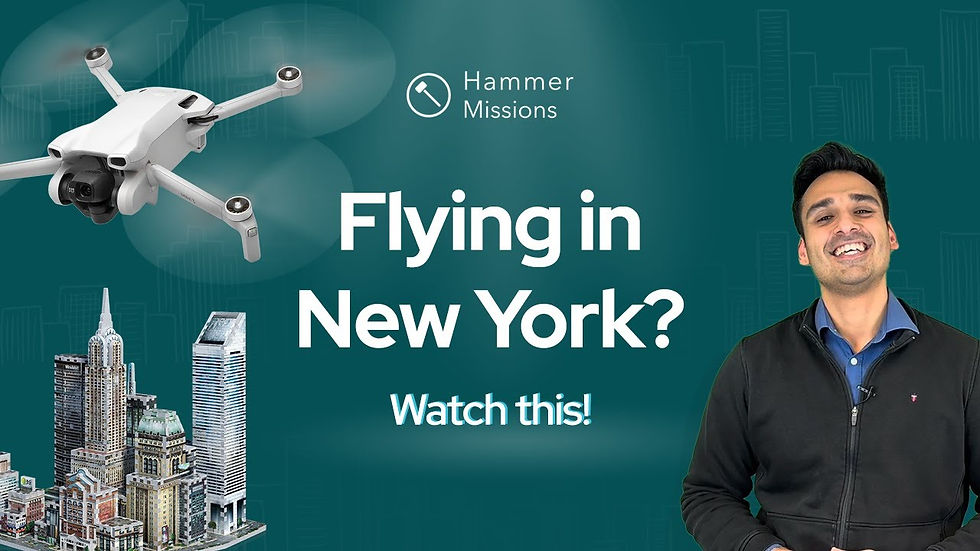How Much Does a Milestone Inspection Cost in Florida?
- Hammer Missions

- Sep 16, 2025
- 4 min read
Following the passage of Florida Senate Bill 4-D in 2022, property managers across the state are facing new requirements for Milestone Inspections. These structural inspections, mandated for condominium and cooperative buildings three stories or higher, must be carried out at 30 years of age (or 25 years if within three miles of the coast) and every 10 years thereafter.
Understanding the cost structure of these inspections is critical for budgeting, planning, and compliance. Below, we break down the key cost drivers — from professional fees to equipment needs — and compare traditional inspection methods vs drone-enabled approaches.

1. The Structure of a Milestone Inspection
Florida Milestone Inspections occur in two phases:
Phase 1 (Visual Inspection): A licensed architect or structural engineer visually examines the building’s structural systems. This may involve binoculars, drones, lifts, or rope access.
Phase 2 (Detailed / Destructive Testing): Triggered if Phase 1 identifies signs of substantial structural distress. Involves sampling, lab analysis, and possible removal of materials for testing.
Costs rise substantially if a building moves into Phase 2.
2. What Drives Traditional Milestone Inspection Costs
Phase 1 – Visual
Professional Fees: $200–$400/hr for licensed engineers; inspections typically require multiple days.
Access Equipment:
Scaffolding: $10K–$30K+ for setup and teardown on a mid-rise.
Swing Stages / Lifts: $2K–$5K per week.
Rope Access Teams: $3K–$7K/day.
Labor: Additional safety staff and assistants needed.
Typical Cost Range (Traditional, Phase 1 only):
Small 3–5 story building: $10K–$15K
Medium 10–20 story building: $20K–$40K
High-rise 20+ stories: $40K–$60K+
Phase 2 – Destructive Testing
If Phase 2 is required, costs increase due to:
Concrete Coring & Sampling: $250–$500 per sample (multiple samples required).
Rebar Detection / GPR Scanning: $3K–$10K depending on coverage area.
Lab Testing: $200–$500 per test (chloride content, carbonation, compressive strength).
Access Costs: More time on scaffolding/lifts.
The typical additional cost of Phase 2 is +50–100% of Phase 1 costs.

3. Cost Drivers of Drone-Based Inspections
Drones are increasingly being used in Florida for facade and roof inspections. They don’t replace destructive testing but dramatically reduce the Phase 1 visual inspection costs.
Phase 1 – Drone-Assisted Visual
Drone Team (Pilot + Engineer Observer): $1.5K–$3K/day.
Equipment: High-resolution RGB drones (thermal drones are optional, costing an additional $500–$1,000/day)
Improved Deliverables: Photogrammetry maps, 2D/3D models, high-res facade images, thermal scans.
Typical Cost Range (Drone, Phase 1):
Small 3–5 story building: $3K–$5K
Medium 10–20 story building: $5K–$10K
High-rise 20+ stories: $10K–$20K
Drone inspections can reduce Phase 1 costs by 40–70% compared to scaffolding or rope-access methods.
Hybrid Approach (Drone + Targeted Traditional Access)
The most cost-effective method is often hybrid: Drones perform a full building scan quickly and inexpensively. Traditional methods (rope access, scaffolding, lifts) are used only for problem areas identified by drones.
This can reduce access costs by 50–80% while still meeting statutory and engineering requirements.

4. Case Examples
Example 1: 5-Story Condo (30 Units)
Traditional Inspection (Phase 1 only): ~$12K
Drone-Assisted Inspection: ~$5K
Savings with drones: ~60%
Example 2: 20-Story Coastal High-Rise (200 Units)
Traditional Inspection (Phase 1): ~$40K
Drone-Assisted Inspection: ~$15K
If Phase 2 required (traditional): +$20K–$30K
Hybrid (Drone + Targeted Phase 2): ~$20K–$25K total
Savings with drones: ~40–50%
5. Who Pays?
By law, Milestone Inspections are the responsibility of the condo or co-op association. In practice, costs are passed on to unit owners via assessments or reserves. For property managers, understanding inspection cost structures is critical for budgeting and communicating with boards and residents.

How Hammer Missions Streamlines Your Milestone Inspection Reports
Meeting Florida’s Milestone Inspection requirements doesn’t just come down to reducing access costs — it’s about streamlining the entire process from data capture to reporting. That’s where Hammer Missions comes in.
With Hammer Missions, drone data from a Milestone inspection can be automatically processed into high-resolution facade maps, 3D models, and thermal overlays. More importantly for property managers, the platform generates structured, engineer-ready inspection reports that can be shared directly with boards and residents. This makes compliance easier to demonstrate, budgeting more transparent, and communication more straightforward, whilst simultaneously reducing reliance on costly scaffolding or rope access.
If you’re managing properties in Florida, leveraging drones alongside Hammer Missions software could save your association significant costs, speed up inspections, and give you clear, professional reports to present with confidence.
Learn how Hammer Missions can support your next Milestone Inspection:
About Us
Hammer Missions is a software AI firm helping companies in the built environment leverage drones and AI for assessing existing conditions. Having seen 5000+ projects, we're pleased to be working with leading firms in AEC to streamline and scale the process of facade inspections. If you're looking to learn more about how AI can automate and accelerate your building assessment projects, please get in touch with us below. We look forward to hearing from you.
Looking to improve your drone inspections? Get in touch with us!




